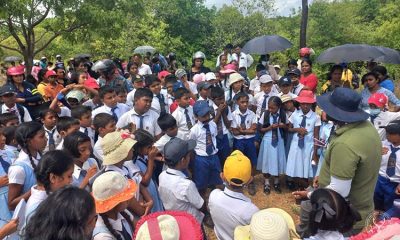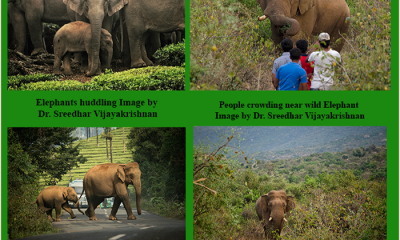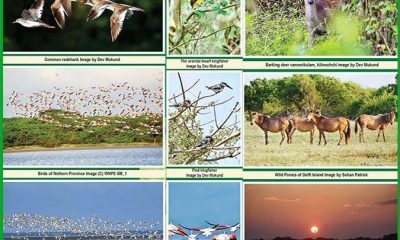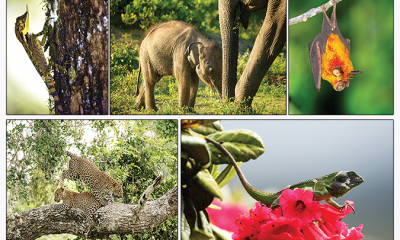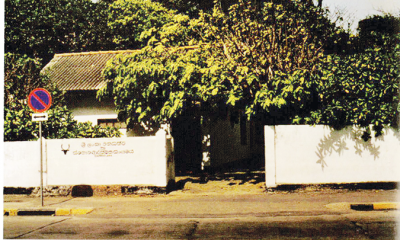News
WNPS files Supreme Court challenge against wind power project in Mannar Island

In a significant move aimed at protecting the unique ecosystem of Mannar Island, environmental protection organization, Wildlife and Nature Protection Society (WNPS), has filed a fundamental rights application in the Supreme Court. This legal action challenges the recent cabinet decision to award a wind power project in Mannar Island to Adani Green Energy Limited of India.
The Petitioner WNPS is represented by President’s Counsel Sanjeeva Jayawardana with Prashanthi Mahindarathe, Revan Weerasinghe and Rukshan Senadheera, instructed by S.W.A Amila Kumara.
WNPS, known for its staunch advocacy for environmental conservation, argues that the project poses a severe threat to the island’s unique biodiversity and pristine landscapes especially in the Mannar Island. The island itself is home to several protected areas such as the Adam’s Bridge National Park, the Viduthalaithivu National Park and the Vankalai Sanctuary.
The former two were declared RAMSAR wetlands only a few months ago by Minister Pavithra Wanniarachchi. In addition, Mannar is the southernmost point of the Central Asian Flyway used by innumerable migratory species, while also being home to several indigenous water bird and bat species.
WNPS contends that the decision to approve the project was made without any appreciation of Mannar’s singular positioning as a biodiversity hub, violating both national environmental protection laws as well as international Conventions. The island’s diverse ecosystems, including mangroves, coral reefs, and wetlands, play a crucial role in maintaining the region’s environmental balance. The organization states that a severe threat exists that the construction and operation of the wind power project could lead to irreversible damage to these ecosystems.
The Petitioner contends that the manner and form of these actions by various authorities grossly abuse the doctrine of public trust reposed in authorities like the Forest Department and Department of Wildlife that have blithely ignored the irreparable ramifications of this project in a protected area replete with vulnerable species and war affected population struggling to survive.
The proposed Adani project will potentially raise the number of turbines on Mannar Island to 82, supplementing the 30 turbines existing as part of the Thambapawani project which has already caused staggering numbers of bird deaths, more than anticipated by the ornithologists consulted on the project. If allowed to continue unabated the extension to the Adani project – titled Phase III – will pockmark Mannar island with 103 turbines across nearly 66% of Mannar’s land mass which has been declared Energy Development Areas.
As one of the oldest conservation organizations in the world, the WNPS challenges the credibility of the Environmental Impact Assessment carried out by the Sustainable Energy Authority of Sri Lanka [SEASL] on behalf of Adani Green Energy. In fact, at page xxi of the Environmental Impact Assessment, it has categorically been admitted that “in the case of Thambapawani Wind Power Project, higher bird collision risks than predicted have occurred, as there are reported bird collision in the transmission lines”.
WNPS argues that this alone should act as a deterrent to proceed with this Project in Mannar, which contradicts the principles of sustainable development. While recognizing the need for renewable energy sources, the organization insists that such projects must be planned and executed in a manner that safeguards environmental integrity. This is particularly so when the EIA itself has identified alternative locations that are more suitable to set up a wind power farm and provides no rationale for how Mannar – the most vulnerable site – was chosen.
The Petitioner highlights a conflict of interest between SLSEA’s role as regulator and their purported role as agent for the Adani group. Given that SLSEA also functions as a regulator, this dual role is inappropriate and raises concerns about the integrity of SLSEA’s actions. The Petitioner deems it shocking that a regulatory body is acting as a project proponent, suggesting that SLSEA’s actions are motivated by extraneous considerations and self-interest.
Under Section 16 of the Sri Lanka Sustainable Energy Act No. 35 of 2007, no entity can undertake an on-grid renewable energy project without a permit from SLSEA. Section 17 grants SLSEA’s project approving committee the authority to issue provisional approvals, and Section 18 mandates this committee to approve or reject final project applications. Thus, SLSEA is the primary licensing authority, making its role as an agent for Adani Green Energy in seeking an EIA particularly inappropriate and illegal.
The Petitioner is also concerned with the SEASL’s line Minister tabling power purchase prices in Parliament far in excess of those assessed in the EIA and entirely disproportionate with regional prices by the same supplier. The Petitioner is concerned that the Minister of Power and Energy Energy intends to approve the project despite lacking the statutory authority to act as the Project Approving Authority, which should be SLSEA.
The EIA estimates the cost of power generation at USD 0.046 per kWh, while the Minister stated it would be USD 0.0885 per kWh. The Petitioner finds the discrepancy alarming, as the contract negotiations are based on a price nearly double the EIA estimate. Despite a later revision to USD 0.0826 per kWh, no valid reasons were provided for this increase. The Petitioner asserts that the project cannot be approved with such escalated costs without overhauling the EIA to reflect the actual cost of power generation.
Finally, the Technical Evaluation Committee recommended a tariff of USD 0.075 per kWh, yet the Cabinet approved a higher cost without explanation, violating procurement procedures. The Petitioner requests the court to call for the recommendations or reports made by the Technical Evaluation Committee and the Cabinet Appointed Negotiation Committee under Article 126 of the Constitution.
The Petitioner notes the project has been portrayed to the public as a Government-to-Government initiative with India, yet no details of contributions, grants, or loans from the Indian government have been disclosed.
Additionally, the project lacks a competitive bidding process, and the Swiss Challenge method has not been followed, violating procurement guidelines. Given the project’s proximity to protected areas, it required assessments and approvals from the Department of Wildlife Conservation (DWC) and the Coast Conservation Department (CCD), which were omitted, rendering the EIA void and unlawful.
WNPS’s legal challenge seeks to ensure that the government adheres to the principles of environmental justice and accountability while supporting the Governments push towards renewable energy. The organization calls for a thorough review of the decision-making process, emphasizing the need for transparency, scientific rigour, and public participation.
As the nation awaits the Supreme Court’s response, the outcome of this case will be closely watched by environmentalists, policymakers, and the general public on whom the tariff burden will eventually rest. The decision will not only impact the future of Mannar Island but also shape the broader landscape of environmental governance in Sri Lanka.
News
US sports envoys to Lanka to champion youth development

The U.S. Embassy in Colombo welcomed the U.S. Sports Envoys to Sri Lanka, former National Basketball Association (NBA) and Women’s National Basketball Association (WNBA) players Stephen Howard and Astou Ndiaye, from June 8 through 14.
The Public Diplomacy section of the U.S. Embassy said that it would launch a weeklong basketball program intended to harness the unifying power of sports, made possible through collaboration with Foundation of Goodness and IImpact Hoop Lab.
While in Sri Lanka, Howard and Ndiaye, both retired professional basketball players, will conduct a weeklong program, Hoops for Hope: Bridging Borders through Basketball. The Sports Envoys will lead basketball clinics and exhibition matches and engage in leadership sessions in Colombo and Southern Province for youth aged 14-18 from Northern, Uva, Eastern and Western Provinces, offering skills and leadership training both on and off the court. The U.S. Envoys will also share their expertise with the Sri Lanka Basketball Federation, national coaches, and players, furthering the development of basketball in the country. Beyond the clinics, they will collaborate with Sri Lankan schoolchildren to take part in a community service project in the Colombo area.
“We are so proud to welcome Stephen and Astou as our Sports Envoys to Sri Lanka, to build on the strong people-to-people connections between the United States and Sri Lanka,” said U.S. Ambassador Julie Chung. “The lessons that will be shared by our Sports Envoys – communication, teamwork, resilience, inclusion, and conflict resolution – are essential for leadership development, community building, equality, and peace. The U.S. Sports Envoy program is a testament to our belief that sports can be a powerful tool in promoting peace and unity.”
News
Rahuman questions sudden cancellation of leave of CEB employees

SJB Colombo District MP Mujibur Rahuman in parliament demanded to know from the government the reasons for CEB suspending the leave of all its employees until further notice from Thursday.
MP Rahuman said that the CEB has got an acting General Manager anew and the latter yesterday morning issued a circular suspending leave of all CEB employees with immediate effect until further notice.
“We demand that Minister Kanchana Wijesekera should explain this to the House. This circular was issued while this debate on the new Electricity Amendment Bill was pending. There are many who oppose this Bill. The Minister must tell parliament the reason for the urge to cancel the leave of CEB employees,” the MP said.However, Speaker Mahinda Yapa Abeywardena prevented Minister Wijesekera responding to the query and said that the matter raised by MP Rahuman was not relevant.
News
CIPM successfully concludes 8th Annual Symposium

The Chartered Institute of Personnel Management (CIPM) successfully concluded the 8th Annual CIPM Symposium, which took place on 31st May 2024. Themed “Nurturing the Human Element—Redefining HRM in a Rapidly Changing World,” the symposium underscored the pivotal role of human resource management (HRM) in today’s dynamic global landscape. Since its inception in 1959, CIPM has been dedicated to advancing the HR profession through education, professional development, and advocacy, solidifying its position as Sri Lanka’s leading professional body for HRM.
Ken Vijayakumar, the President of the CIPM, graced the occasion as the chief guest. The symposium commenced with the welcome address by the Chairperson, Prof. Arosha Adikaram, followed by the Web Launch of the Symposium Proceedings and Abstract Book by the CIPM President. The event featured distinguished addresses, including a speech by Chief Guest Ken Vijayakumar, President of CIPM, and an address by Guest of Honor Shakthi Ranatunga, Chief Operating Officer of MAS Holdings Pvt. Ltd., Sri Lanka.
The symposium also featured an inspiring keynote address by Prof. Mario Fernando, Professor of Management and Director of the Centre for Cross Cultural Management (CCCM) at the University of Wollongong, Australia.
Vote of Thanks of the inauguration session was delivered by Dr. Dillanjani Weeratunga, Symposium Co-chair.
The symposium served as a comprehensive platform for researchers to present their findings across a wide range of critical topics in HRM. These included Cultural Diversity and Inclusion, Talent Development and Retention, Ethical Leadership and Corporate Social Responsibility, Adapting to Technological Advancements, Mental Health and Well-being at Work, Global Workforce Challenges, Employee Empowerment, and Reskilling and Upskilling.
The plenary session was led by Prof. Wasantha Rajapakse. Certificates were awarded to the best paper presenters during the valedictory session, followed by a vote of thanks delivered by Kamani Perera, Manager of Research and Development.
The annual symposium of CIPM was a truly inclusive event, attracting a diverse audience that spanned undergraduates, graduates, working professionals, research scholars and lecturers. This widespread interest highlights the symposium’s significance in the field of HRM, offering a unique opportunity for everyone to network and learn from scholarly brains.The CIPM International Research Symposium was sponsored by Hambantota International Port, Sri Lanka Institute of Information Technology (SLIIT), E B Creasy & Co. PLC, and Print Xcel Company.


